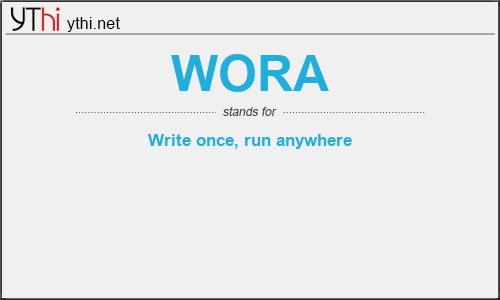What does WORA mean? What is the full form of WORA?
The Full Form of WORA is Write once, run anywhere.
Write once, run anywhere (WORA), or sometimes Write once, run everywhere (WORE), was a 1995 slogan created by Sun Microsystems to illustrate the cross-platform benefits of the Java language. Ideally, this meant that a Java program could be developed on any device, compiled into standard bytecode, and be expected to run on any device equipped with a Java virtual machine (JVM). The installation of a JVM or Java interpreter on chips, devices, or software packages became an industry standard practice.
A programmer could develop code on a PC and expect it to run on Java-enabled mobile phones, as well as on routers and mainframes equipped with Java, without any adjustments. This was intended to save software developers the effort of writing a different version of their software for each platform or operating system they intend to deploy on.
This idea originated as early as in the late 1970s, when the UCSD Pascal system was developed to produce and interpret p-code. UCSD Pascal (along with the Smalltalk virtual machine) was a key influence on the design of the JVM, as is cited by James Gosling.[citation needed]
The catch is that since there are multiple JVM implementations, on top of a wide variety of different operating systems, there could be subtle differences in how a program executes on each JVM/OS combination, possibly requiring an application to be tested on each target platform. This gave rise to a joke among Java developers: Write Once, Debug Everywhere
WORA
means
Write once, run anywhere![]()
Translate Write once, run anywhere to other language.


Leave a Reply
You must be logged in to post a comment.